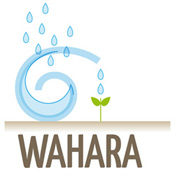Project Facts
- Details
- Created on Monday, 01 December 2014 14:17
- Written by Erik van den Elsen
The WAHARA Project
The project addresses the call ENV.2010.3.1.1-4 Water harvesting technologies in Africa, with the purpose to contribute to ensuring food and water security in rainfed Africa. It will do so by:
Key facts
- Title: Water Harvesting for Rainfed Africa: investing in dryland agriculture for growth and resilience,
- Starting date: 01 March 2011,
- Ending date: 29 February 2016,
- Duration: 5 years,
- EU contribution: 2.0 M€,
- EU Call: ENV.2010.3.1.1-4: Water harvesting technologies in Africa.
Objectives
Main objective: Develop innovative appropriate WH technologies for different geographical regions of rainfed Africa;
- Emphasis 1 on WH technology design: Design WH technologies that have synergies with existing rainfed farming systems (i.e. that are sustainable); at least 10 designs of WH technologies adapted to local conditions will be tested.
- Emphasis 2 on WH technology impact: Assess at catchment scale the on-site and downstream impact (environmental services) of WH technologies; impact assessments will be prepared for 4 catchments, and for different scenarios of drivers of change.
- Emphasis 3 on WH technology integration: Develop criteria for sustainable impact on improving livelihoods with WH technologies under various pressures, considering economic development; guidelines for adapting WH technologies across rainfed Africa will be presented for at least 10 WH technologies, considering financial and economic cost effectiveness.
- Emphasis 4 on WH technology learning and action: Develop guidelines to facilitate stakeholder learning and action about WH technologies in different (biophysical and socioeconomic) conditions; dissemination products targeted to stakeholders from local to international level will be developed and distributed, and guidelines to enable learning and action on WH will be prepared for third-party follow-up initiatives.
The project aims to develop solutions applicable beyond local study sites and indeed across the continent. In order to reach this objective, study sites are selected that are representative for rainfed Africa: Tunisia in the North, Burkina Faso in the West, Zambia in the South and Ethiopia in the East. Apart from the geographical spreading, a wide range of environmental and socio-economic conditions is also covered by these sites (as shown in Table 1.1 at country level).
Project Partners
The WAHARA project is composed of the following partners:
Partner 1 – Alterra, Netherlands (coordinator)
Partner 2 - Leeds University, United Kingdom
Partner 3 – MetaMeta, Netherlands
Partner 4 - Institut des Régions Arides, Tunesia
Partner 5 – INERA, Burkina Faso
Partner 6 - Mekelle University (MU), Ethiopia
Partner 7 – GART, Zambia
Partner 8 - Wageningen University - LDD (WU-LDD), Netherlands
Partner 9 - Agrotechnology Consult Africa (ACA), Netherlands
